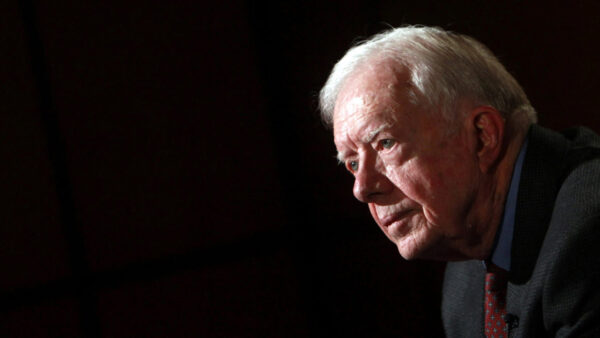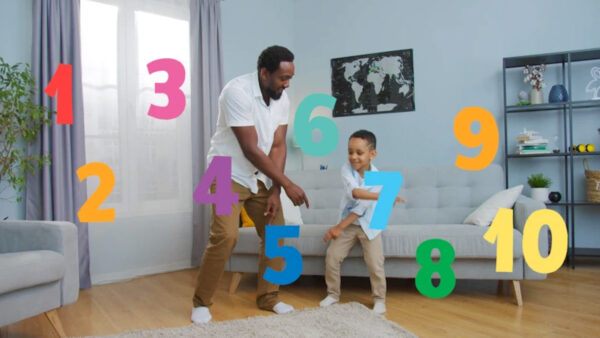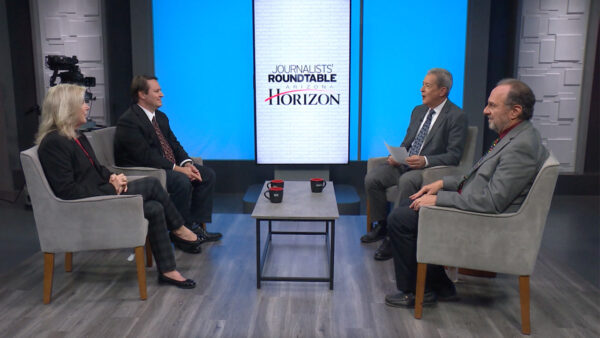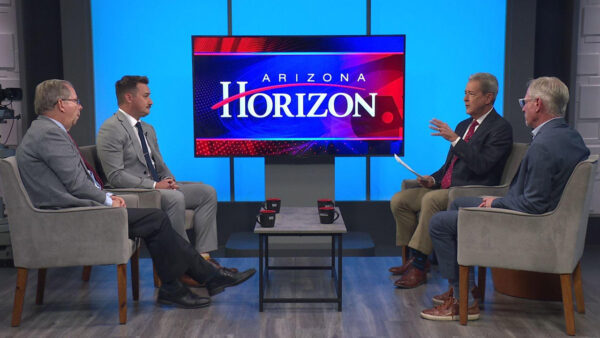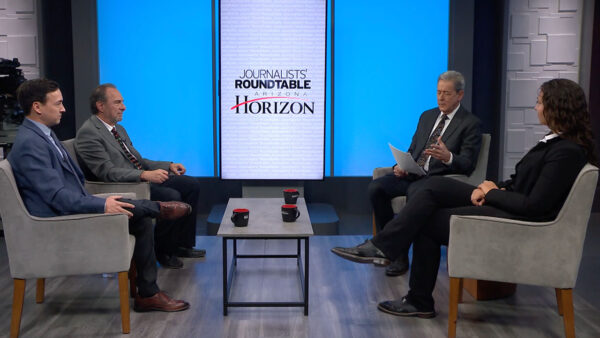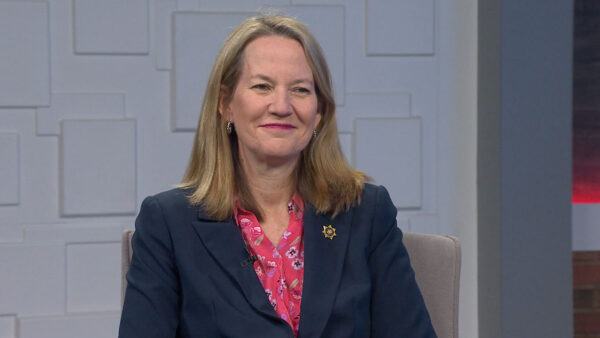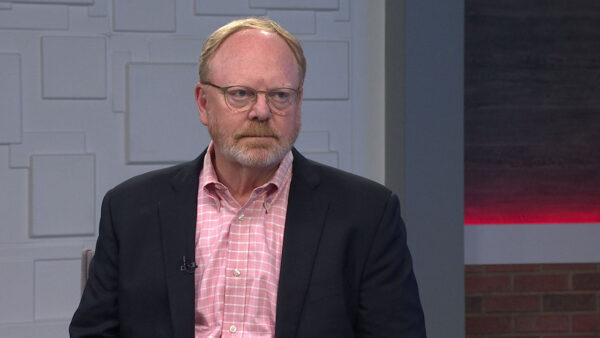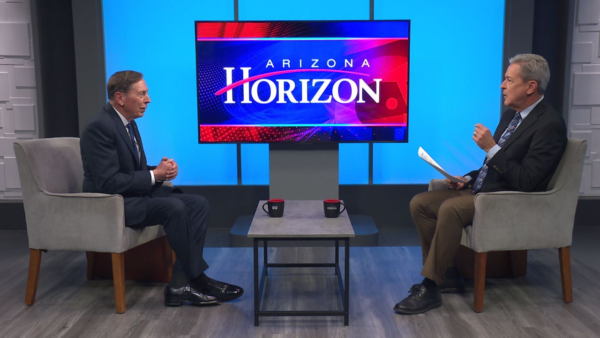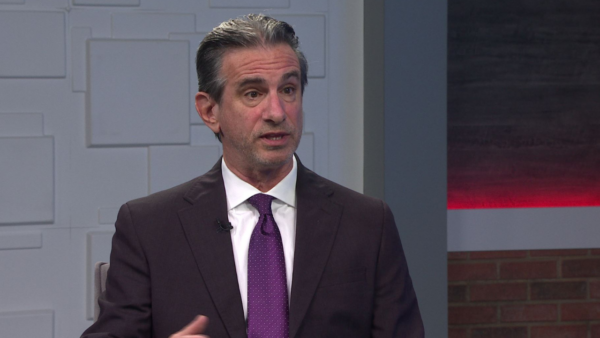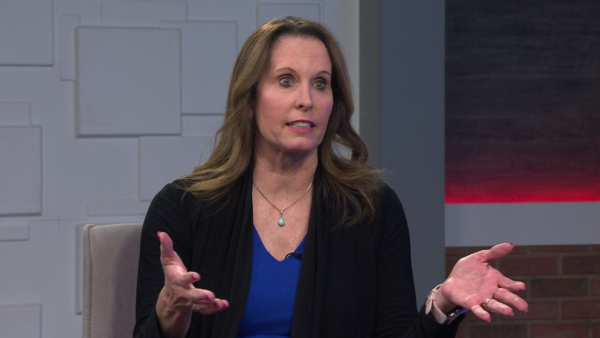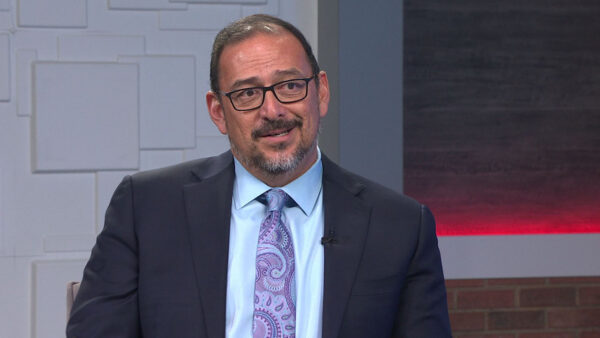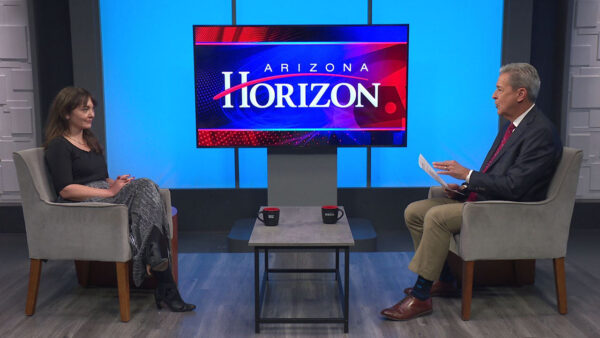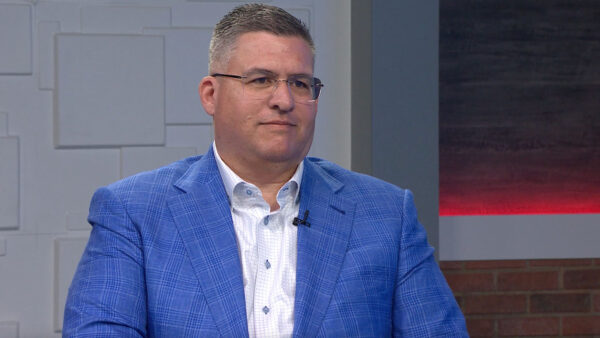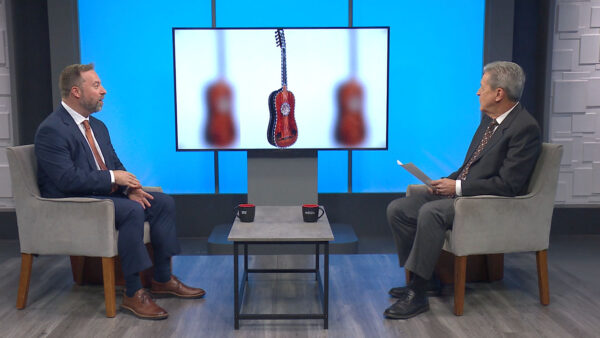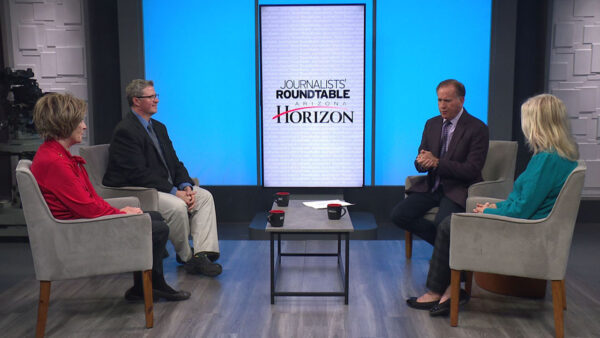The current economic recession has taken its toll on downtown Tempe. We’ll explore the current state of Mill Avenue and plans to reinvigorate the area. Guests include Downtown Tempe Corporation’s Nancy Hormann, and longtime Mill Avenue retailer and property owner Vic Linoff.
Ted Simons: Mill Avenue in downtown Tempe has an energy and an atmosphere that few valley cities possess. But when the economy tank's so did parts of Mill Avenue. As David Majure shows us, vacant retail space and unfinished high-rise condos are a testament to those tough economic times.
Casaundra Brown: Downtown Tempe is an entertainment district. This is where people come to have fun, it's one of the only areas you can come to and walk. You park and walk the whole area and go to a mix of stuff.
David Majure: But fewer things are in that mix. When the economy went south, stores closed. Redevelopment projects stalled, and luxury condos were left unfinished. Avenue Communities was building the Centerpoint condominiums until mortgages limited the company financing the project went bankrupt.
Casaundra Brown: They have had to go to court and rearrange their money and they've just been having to wait to hear back on where their financing is, so the project is currently stalled but they still plan on moving forward. It's just going to take a little longer than we initially planned.
David Majure: In the shadows of the empty high-rise is another property that's become a bit of a ghost town.
Casaundra Brown: We are at 6th and Mill right now where a majority of the Centerpoint on Mill complex is. And this is sort of the area that we've seen a little bit of issue, it's really all of Mill is doing all right except the south end of Mill Avenue.
David Majure: Centerpoint on Mill is a victim of bad timing. Before the economy turned sour, D.M.B.Pproperties had plans to sweeten the area by tearing down these buildings and starting over.
Casaundra Brown: Right when they decided they were going to redevelop, the economy tanked, so they obviously had let people out of their leases because they were going to tear down the complex and now with the economy the way it is, they're not going to redevelop and now they want to recruit businesses back in.
David Majure: But businesses are having a hard time finding money to move in, so store fronts remain empty and it's taking creative thinking to fill them up.
Casaundra Brown: We're working on a lot projects to reinvigorate this specific area. We have a retail competition going on offering 12 months rent to the winning business plan, also maybe some incentives for the top three business plans we receive. So we're really working on reinvigorating this part of Mill Avenue.
David Majure: Downtown Tempe community, a nonprofit that manages and promotes the Mill Avenue district, has renovated the former Harkins Theater.
Casaundra Brown: We're like what if we just programmed it with really affordable space for local musicians or performers. And really made it a really cool live performance venue, when you go inside they like to call it urban chic. We work D.M.B. and they were able to give us this building for $10 a year to open Madcap Theaters, which is the mill avenue district community arts project.
David Majure: If there's any silver lining to be found in this story, it may be the opportunity for downtown Tempe to reinvent itself and emerge from this recession stronger than ever.
Casaundra Brown: It gives us a chance to bring back the independent local retailers that make Mill Avenue a destination as opposed to the big change that we had before.
Ted Simons: Joining me now is Nancy Hormann, president and executive director of downtown Tempe community, a nonprofit that represents property owners in the Mill Avenue district and Vic Linoff, a former mill avenue retailer who plans to redevelop the alley behind the building he owns near 5th street and mill. Thank you both for joining us tonight on "Horizon." Nancy, I want to start with you, what happened to Mill Avenue?
Nancy Hormann: I think it was a combination of a lot of development coming all at one time. A lot of development happening that was planned and the economy going south before the plans could take off. I think in the long term Mill Avenue was trying to be something that it wasn't or would never be, by bringing in big chains and something that you could get in every shopping center in the whole valley. And it lost its independence.
Ted Simons: Hold that thought because I want to come back to that one. But Vic, your view, what happened down there? Talking about Mill Avenue but cities all around the valley going through similar experiences, maybe in a little different ways but Mill Avenue's kind of large right now. What happened down there?
Vic Linoff: Well, certainly Mill Avenue is experiencing the effects of the economy, but many of the problems Nancy did allude to are a result of a flawed business model that was created way back in the city in the '70s when the city was making decisions on what it wanted for the future of Mill Avenue, and part of that had to do with the replacement of very viable historic buildings with new buildings, and the minute you start new construction you're going to add significant cost to spaces.
Ted Simons: To Nancy's point, what does Mill Avenue want to be and, you know, connect that question with another one, what should it be?
Vic Linoff: Mill Avenue should be a street of unique innovative destination businesses. They don't have to be necessarily independent businesses. They can have a national affiliation. There are businesses like Urban Outfitters who don't go to malls. What you want to do is stay away from the businesses that will traditionally go to a mall because customers say if I have a choice, I'm going to go to the mall and not to downtown Tempe for that product.
Ted Simons: Is that what Mill Avenue should be, and is that what Mill Avenue wants to be? Is that what Tempe wants to see from Mill Avenue? We get a mixed message sometimes from the city as to what Mill Avenue wants to be.
Nancy Hormann: I think no win was really asking what Mill Avenue wants to be, and I think right now we are all in the same direction of making it an independent destination, a reason to come there. If you can find what's there in five other places in the valley, why are you going to go there? You're going to go to the one that's closest to you. We are all looking at Mill Avenue as destination retail, things that are something exciting to go to, as well as entertainment. We are the only walkable urban environment in the valley.
Ted Simons: Is the city helping out with this? What is the city doing? Because right now you walk down Mill Avenue from university and the first few blocks you see a lot of empty store fronts.
Nancy Hormann: The city is doing a great job at looking at the future, and what we're doing is sitting down - and a lot of ordinances, very common in many cities, not just Tempe, the ordinances and all the things are written citywide, so the suburban ordinances are the same thing as the urban ordinances are. There's some of the things that would make us a little bit more eclectic and a little more edgy are not allowed because it's the same suburban rule. We are rewriting all of those and doing urban ordinances, urban rules and regulations for downtown, in order to encourage that. And the city is right there with us.
Ted Simons: As a property owner is the city right there with you?
Vic Linoff: The city is improving, regulation has always been an issue, and the city's had trouble distinguishing between what's needed in a dense urban area like a downtown and Elliot Road where it's an automobile driven corridor, and through activities of the chamber, the D.T.C. and other organizations, it's really been moving towards recognizing you have to have a different set of rules for downtown. There's one point I wanted to make that I think when you ask what Mill Avenue wants to be, for a long time the city philosophy was it's better to import creativity,
Borders makes more sense than a Changing Hands. And I would argue that we've had some really creative businesses that we can export, Changing Hands was the 1980 or 2008 book seller of the year for Publisher's Weekly awarded it that, one of the most successful bookstores in the country. Those kind of businesses can start in downtown. We've got a big university right next door. People with lots of ideas that want to begin to experiment, downtown should provide that opportunity.
Ted Simons: It all sounds great and I remember Changing Hands years ago, used to go there for years, one of the reasons they left and one reason I hear that other individual type shops, mom and pops aren't moving in, the rents are too high. First of all, is that a valid argument? And if it is, what do you do about it?
Nancy Hormann: I think it's a valid argument with some of our property owners. Absolutely. But not all of them. They are realistic now. I think that there's a change, the economy has changed everyone. And people are getting more realistic about the rental rates. And they're doing more things to attract people that can't -- could not have afforded to come in there and be an independent business. We're hosting a competition for the best retail concept that fits Mill Avenue, what do people think fits Mill Avenue and we are going to along with one of our property owners award that winner a year's free rent in one of our spaces because we're trying to encourage that entrepreneurism.
Vic Linoff: To your question, what you said earlier, we're working - Mill Avenue is essentially a linear street. There's very little off of MillAvenue, and I'm working with the owner of the two properties to the south to create what we're calling an off Mill experience, using the alleyway as a small intimate pedestrian corridor, because we own the properties and we've owned them for a long time, we don't have to go in and buy expensive land. All we've got to do is pay for the cost of buildings, so I think that in many cases we could provide small spaces for incubator startup businesses at half of the going rent on Mill Avenue and if you're successful in that incubator, then you graduate to the street or you move out to larger quarters, so that's one of the ways of keeping the rents down, encouraging longtime property owners to make some investment because again all we have to do is just pay for the cost of the building.
Ted Simons: All right. Very good. We have to stop it right there. I wish we had more time to talk though, but good luck and we hope the best for you and of course other cities around the valley facing similar problems, but Mill Avenue, everyone seems to know about Mill Avenue, not because of A.S.U. or just the things going on down there, so thank you again for joining us tonight.
Vic Linoff: Thank you very much, and thank "Horizon" for taking the interest in this issue.
Ted Simons: Very good. Thank you.
Nancy Hormann:Downtown Tempe Corporation;Vic Linoff:Longtime Mill Avenue retailer and property owner;
